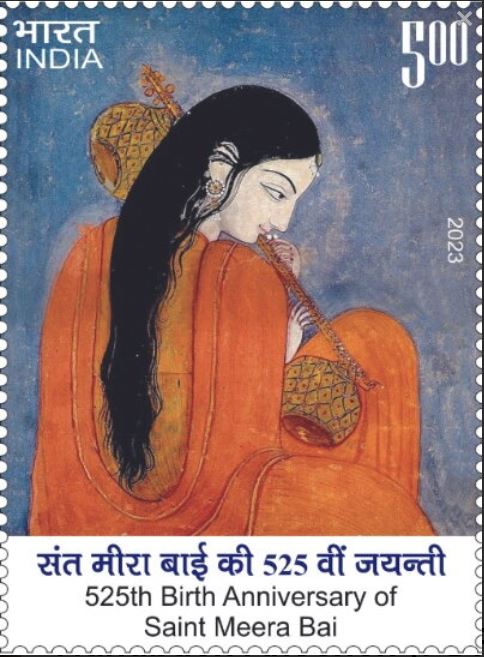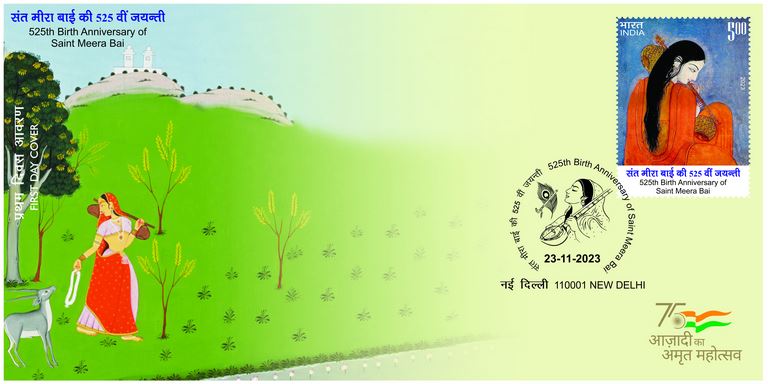
Stamp issued in rememberance of the 525th birthday of the mystic Meera Bai (Mirabai)
After celebrating Hildegard of Bingen as the living mystic of the month on her own stamp in September, I didn’t want to miss the opportunity to choose an equally inspiring personality from another part of the world in November. My choice fell on an Indian stamp that focuses on the mystic Meera Bai or Mirabai.
Mirabai (1498-1546) was not only an Indian mystic of exceptional stature, but also a poetic virtuoso. Her very personal, ecstatic songs of love, praise and lamentation have survived the ages and are still recited and sung by Hindus, Sikhs, Muslims and Christians alike on the Indian subcontinent and are broadcast enthusiastically on Indian radio stations.

Postcard showing Krishna with a cowherdess
Born in the royal circles of the Rajputs, Mirabai was imbued with the grace of the image of Krishna from an early age. In 1516, she was married to Prince Bhoj Raj from the powerful Rajput kingdom of Mewar. But Mira posed a challenge from the very beginning. Not only did she refuse to consummate the marriage, as her love was for Krishna, but she also refused to worship the goddess of her husband’s family. She rejected gifts of silk and jewels and insisted on joining the community of bhaktas.
When her husband died in the war, she stubbornly refused to follow him to his death. One legend tells of a poisoned cup from which she is said to have drunk without harm. Krishna would have turned the poisonous potion into nectar. According to her songs, she survived two assassination attempts and was even imprisoned for a time. Eventually, she left the splendor of the palace and returned to her original family.

Mirabai was depicted on an Indian stamp as early as 1952
However, also this family disapproved of her unconventional actions. Around 1527, she set off as a fearless wanderer to pilgrimage sites associated with the life of Krishna. Her popularity grew rapidly. Even before she reached a place, people would gather to sing her songs, 2023 of which have survived to this day – despite being passed on orally. She finally spent the last days of her life on the coast of the Arabian Sea.
In her life, Mirabai unswervingly followed the Bhakti tradition, a mystical religious movement in northern India in the 13th-17th centuries. For her, there were no differences before God and she longed to approach him directly without the observance of strict rites or mediation by priests. The Bhakti tradition can be compared to the devotion of Christian nuns who call themselves the ‘bride of Christ’ (parallels to Hildegard of Bingen?).

First day cover with stamp and cancellation
Mirabai’s life resonates today for many reasons. First, there are her words, which express a kind of female liberation with beauty and joy. Her rejection and even disdain for wealth speaks not only to the poor, but to the hearts of all. And then there is her fearless rebellion against injustice within the family and kinship groups, which is still considered an inspiration today, especially in India.
Philatelic data on the stamp:
- Country:India
- Ausgabedatum:2023-11-23
- Colors:multicolored
- Format:Special stamp
- Printing:Offset printing
- Postal value:5 ₹ – Indian rupee
